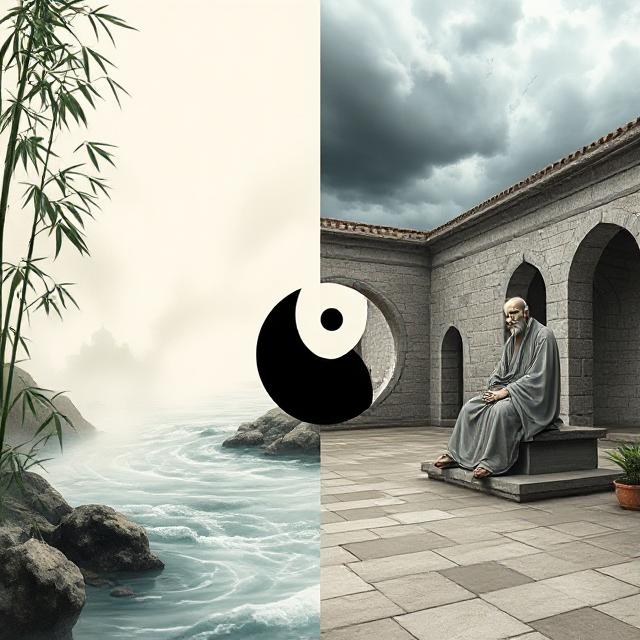
Table of Contents
Daoist Wu Wei vs Stoic Ataraxia: Two Ancient Paths to Peace
Daoist Wu Wei vs Stoic Ataraxia offers a profound comparison between Eastern and Western philosophies of inner calm. Despite arising from radically different traditions, both Daoism and Stoicism point to a life of serenity—but by distinct means: the Chinese Daoist ideal of effortless action (wu wei) versus the Greco-Roman Stoic goal of unshakable tranquility (ataraxia).
Are these merely poetic analogs, or do they reveal different roads to the same summit? In this article, we explore the roots, methods, and implications of these two ancient approaches to the good life.
I. What Is Wu Wei in Daoism?
Wu wei (無為) is often translated as “non-action,” but this is misleading. It doesn’t mean doing nothing. Rather, wu wei refers to acting in accordance with the Dao (the Way)—so seamlessly that effort disappears. Actions emerge naturally, without forcing, resistance, or ego.
Origins in the Dao De Jing
Laozi writes:
“The Master doesn’t try to be powerful; thus he is truly powerful.”
Wu wei is about yielding to the flow of reality, much like water flowing around rocks. It is the art of alignment rather than domination.
Key Aspects:
- Spontaneity over calculation
- Harmony with nature and cycles
- Simplicity and humility
- Letting go of control, desire, and excess
A ruler practicing wu wei governs not by decree but by example and non-interference. A sage practices it by ceasing resistance and letting the Dao act through them.
II. What Is Ataraxia in Stoicism?
Ataraxia is a Greek term meaning “freedom from disturbance” or tranquil equanimity. For Stoics, the path to ataraxia lies in mastering one’s judgments, emotions, and desires.
Origins in Stoic Thought
Rooted in the teachings of Zeno, Epictetus, Seneca, and Marcus Aurelius, Stoicism urges us to distinguish between what we can control and what we cannot. Virtue lies in accepting the latter and exercising rational discipline over the former.
“It is not things that disturb us, but our opinions about them.” — Epictetus
Key Practices:
- Focus on virtue as the only true good
- Detachment from external outcomes
- Rational reflection and journaling
- Training the mind to meet misfortune with calm
Ataraxia is not passivity. It is active mental composure, rooted in reason, ethics, and an unshakable inner fortress.
III. Philosophical Comparison: Nature vs Reason
| Feature | Wu Wei (Daoism) | Ataraxia (Stoicism) |
|---|---|---|
| Origin | Ancient China (~6th c. BCE) | Ancient Greece (~3rd c. BCE) |
| Guiding Principle | Harmony with the Dao | Living in accordance with reason |
| Goal | Effortless flow | Freedom from disturbance |
| Method | Letting go, yielding | Rational discipline, acceptance |
| Ethics | Flexible, intuitive | Virtue-based, universal |
| Relation to Nature | Become one with nature | Accept fate as part of nature |
Daoism emphasizes merging with the cosmos, while Stoicism emphasizes mastery over the self. Both reject the pursuit of wealth, fame, or power.
IV. Wu Wei in Practice
Daily Examples:
- A craftsman who works fluidly without hesitation
- A leader who governs by minimal interference
- A person who adapts without resistance to changing life circumstances
Wu wei values effortless excellence, much like the flow state described in modern psychology.
Risks or Misunderstandings:
- It may be misunderstood as laziness
- It is not a retreat but a deep form of responsiveness
The Daoist does not control nature—they become nature.
V. Ataraxia in Practice
Daily Examples:
- Remaining calm during conflict
- Practicing negative visualization (imagining loss)
- Journaling to reflect on judgments and emotions
Ataraxia develops over time as a habit of mind. The Stoic must train daily, just as an athlete trains the body.
Misunderstandings:
- Stoicism is not cold indifference
- It fosters empathy through rational compassion
The Stoic does not deny emotion—they clarify and redirect it.
VI. Which One Speaks to Modern Life?
ModernDaoist wu wei vs Stoic ataraxia culture, with its noise, speed, and chaos, may benefit from both wu wei and ataraxia:
- Wu wei offers relief from striving and restores a connection to the flow of life.
- Ataraxia offers emotional armor against uncertainty and external volatility.
Wu wei whispers: Stop pushing. Ataraxia replies: Start accepting.
Both invite us to release the illusion of control and cultivate inner stillness.
VII. Conclusion: Different Currents, Same Ocean
In the debate of Daoist Wu Wei vs Stoic Ataraxia, we find not a clash, but a complement. Each maps a path to psychological freedom, ethical living, and philosophical depth.
- One dissolves the self into nature.
- The other steels the self with reason.
You can sit by a river and let it carry you (wu wei), or stand firm while the wind howls (ataraxia). Either way, peace is not the absence of life’s storms, but the presence of something deeper within you.